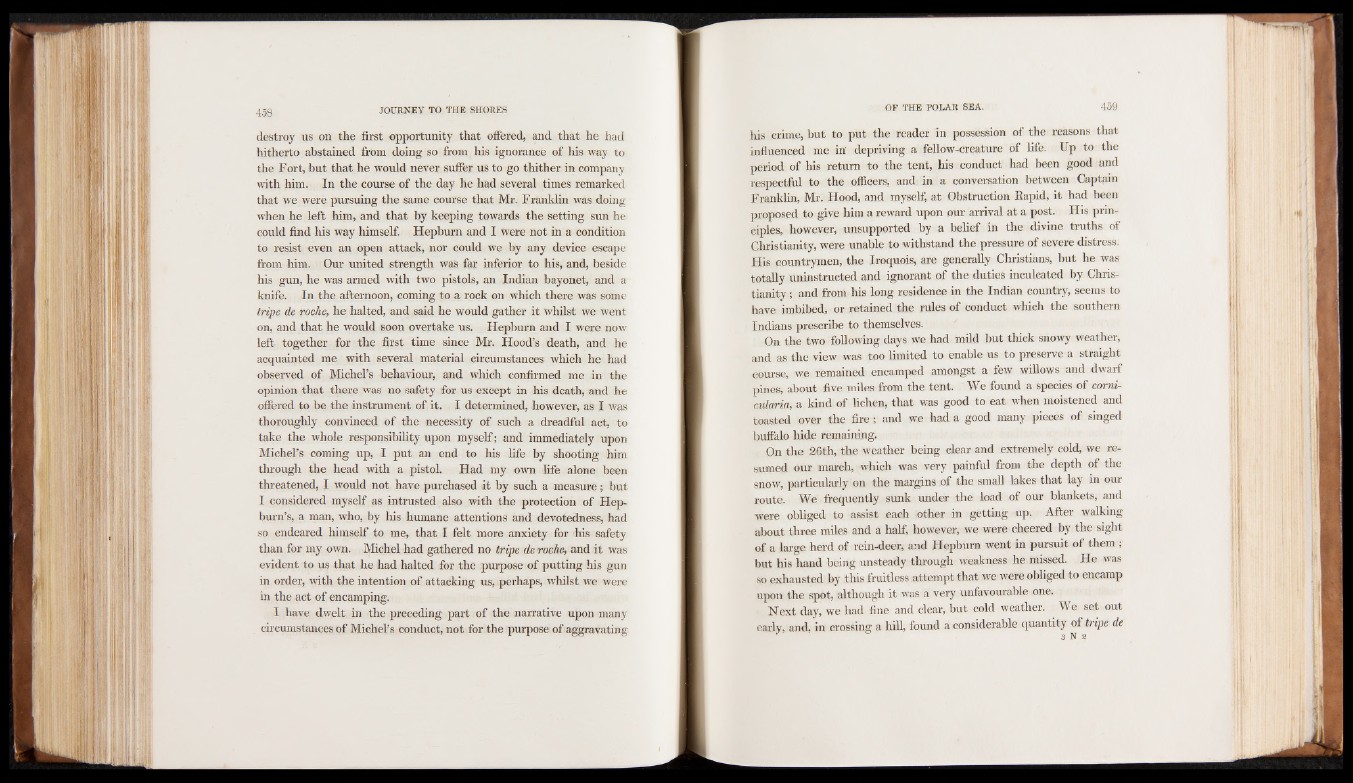
destroy us on the first opportunity that offered, and that he had
hitherto abstained from doing so from his ignorance of his way to
the Fort, but that he would never suffer us to go thither in company
with him. In the course of the day he had several times remarked
that we were pursuing the same course that Mr. Franklin was doing
when he left him, and that by keeping towards the setting sun he
could find his way himself. Hepburn and I were not in a condition
to resist even an open attack, nor could we by any device escape
from him. Our united strength was far inferior to his, and, beside
his gun, he was armed with two pistols, an Indian bayonet, and a
knife. In the afternoon, coming to a rock on which there was some
tripe de roche, he halted, and said he would gather it whilst we went
on, and that he would soon overtake us. Hepburn and I were now
left together for the first time since Mr. Hood’s death, and he
acquainted me with several material circumstances which he had
observed of Michel’s behaviour, and which confirmed me in the
opinion that there was no safety for us except in his death, and he
offered to be the instrument of it. I determined, however, as I was
thoroughly convinced of the necessity of such a dreadful act, to
take the whole responsibility upon myself; and immediately upon
Michel’s coming up, I put an end to his life by shooting him
through the head with a pistol. Had my own life alone been
threatened, I would not have purchased it by such a measure; but
I considered myself as intrusted also with the protection of Hepburn’s,
a man, who, by his humane attentions and devotedness, had
so endeared himself to me, that I felt more anxiety for his safety
than for my own. Michel had gathered no tripe de roche, and it was
evident to us that he had halted for the purpose of putting his gun
in order, with the intention of attacking us, perhaps, whilst we were
in the act of encamping.
I have dwelt in the preceding part of the narrative upon many
circumstances of Michel’s conduct, not for the purpose of aggravating
his crime, but to put the reader in possession of the reasons that
influenced me in depriving a fellow-creature of life. Up to the
period of his return to the tent, his conduct had been good and
respectful to the officers, and in a conversation between Captain
Franklin, Mr. Hood, and myself, at Obstruction Rapid, it had been
proposed to give him a reward upon our arrival at a post. His principles,
however, unsupported by a belief in the divine truths of
Christianity, were unable to withstand the pressure of severe distress.
His countrymen, the Iroquois, are generally Christians, but he was
totally uninstructed and ignorant of the duties inculcated by Christianity
; and from his long residence in the Indian country, seems to
have imbibed, or retained the rules of conduct which the southern
Indians prescribe to themselves.
On the two following days we had mild but thick snowy weather,
and as the view was too limited to enable us to preserve a straight
course, we remained encamped amongst a few willows and dwarf
pines, about five miles from the tent. We found a species of corni-
cularia, a kind of lichen, that was good to eat when moistened and
toasted over the fire; and we had a good many pieces of singed
buffalo hide remaining.
On the 26th, the weather being clear and extremely cold, we resumed
our march, which was very painful from the depth of the
snow, particularly on the margins of the small lakes that lay in our
route. We frequently sunk under the load of our blankets, and
were obliged to assist each other in getting up. After walking
about three miles and a half, however, we were cheered by the sight
of a large herd of rein-deer, and Hepburn went in pursuit of them ;
but his hand being unsteady through weakness he missed. He was
so exhausted by this fruitless attempt that we were obliged to encamp
upon the spot, although it was a very unfavourable one.
Next day, we had fine and clear, but cold weather. We set out
early, and, in crossing a hill, found a considerable quantity of tripe de 3 N 2